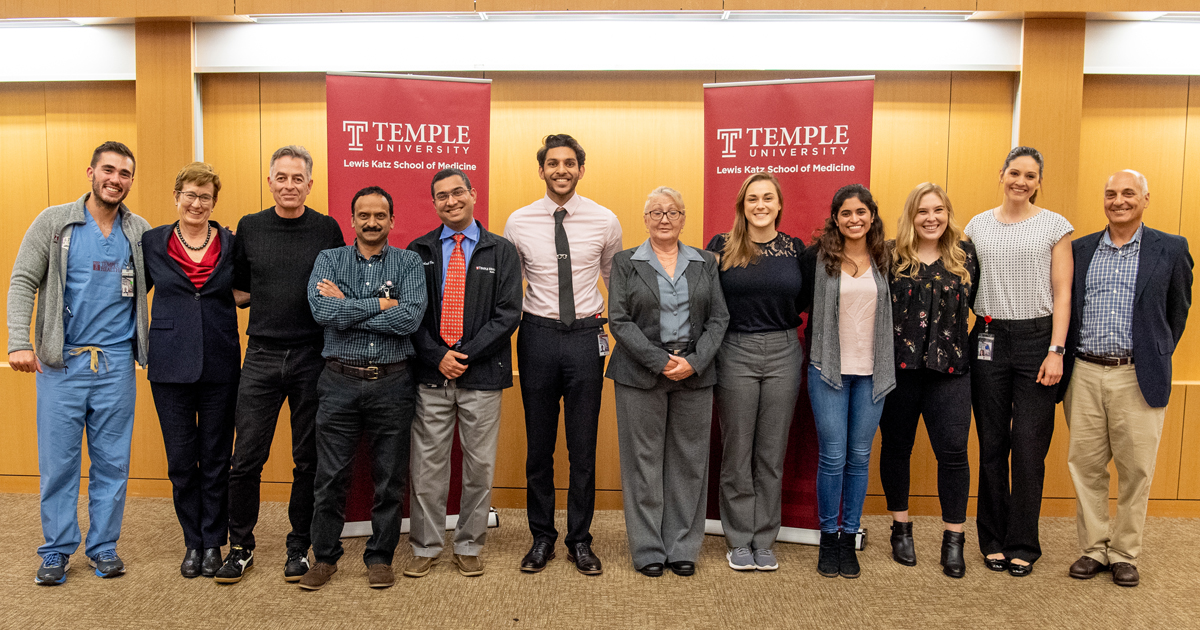At the conclusion of every Temple Health Story Slam, blank index cards are passed throughout the first-floor auditorium in the Medical Education and Research Building and the audience is asked to vote for their favorite story from the night. As a testament to the vulnerability that was displayed by the storytellers at the October 16 event, every one of the 11 received votes. And, for the first time, there was a three-way tie for the audience’s favorite.
Jen Eurich, a second-year medical student, read in hurried clips. “I’m horrified to be up here today,” she said before she began. In graphic detail, a hectic scene in a trauma bay unfolded, where Eurich, then a first-year medical student, observed a man about her age being ushered in on a gurney with life-threatening gunshot wounds.
“I’d never seen a red so red, it pooled underneath you,” Eurich said.
After the patient was pronounced dead, Eurich said the attending physician praised her for keeping such a calm demeanor. But it was the result of shock more than it was a conscious effort. Eurich abruptly broke down as she tried to explain what she was really feeling in that moment. She collected herself, but only for another sentence or two.
“This really gets me going and I don’t know why. Yeah, I do,” she said to the audience, which began to cheer her on. She continued with her story: “I watched a man die today.”
That night, and in the days that followed, Eurich said she struggled to come to terms with the objective, enthusiastic student she was in the trauma bay. The trouble with this work, she said, is that “we fail to see your humanity, and along the way, we lose our own.”
Eurich’s account, “Front Row Seat,” was an audience favorite. As was “Post-Operation Weight Chart,” an ode to Rachael Smith’s father that was tinged with pride, sadness and anger.
His decline from esophageal cancer was swift, but his death was unnecessary, said Smith, also a second-year medical student. He kept in constant contact with his daughter, texting her every morning and calling her every night to ask what she learned that day. She saw him as her ultimate protector, a Bryan Mills-in-Taken-type. But he was also someone who couldn’t ask for help.
A few weeks after his death, Smith discovered her father had been logging his weight every day since his surgery. “In five days, he lost seven pounds,” she said. And with that, anger began to bleed into her sadness. She blames him for not telling someone he was in trouble. She blames his doctors for not observing him closely enough. And she blames herself for being too consumed with her studies to check in more often.
But Smith is trying to turn her negative experience into something positive. “I want to make sure no one else’s daughter has to ask the questions I’m asking now,” she said. “So I’m going to continue to learn from my dad’s death and become a better physician for it.”
The storytellers came from across the Temple University Health System. Bhishak Kamat, MD, a radiologist, shared a self-deprecating account of when he reluctantly responded to an apparent medical emergency mid-flight as a medical student. Mary Morrison, MD, MS, paid homage to her mentor. “Mentors can appear as unlikely figures and stay with you,” she said.
KerriAnn Finnegan, a fourth-year medical student, recalled a patient who still resonates with her from her surgical rotation earlier this year. Unsure how to equate the vibrant young woman who entered the clinic a day earlier with the intubated patient who suffered a stroke in the midst of a cancer diagnosis, Finnegan did what came naturally: She visited the patient and her parents every day and she prayed for them.
“What I realized is, when you show up and care, people notice. And it makes a difference,” she said. “Compassion matters.”
Christopher Goodwin, MD, ABFP, was the last to take the mic for the night. New to Temple, his charisma quickly captivated the audience. His story was voted the third audience-favorite. He, too, discussed a patient who forever changed him. During the winter of 1999, Dr. Goodwin was working in a clinic in the Pacific Northwest. A homeless man came in one day concerned about a burn on one of his feet.
The patient filled the room with a scent that was equal parts unwashed body, campfire smoke, urine, and fruity alcohol. “But the dog was worse,” Dr. Goodwin said. The patient refused to be parted from his dog, so Dr. Goodwin allowed him to stay.
The patient would later limp out of the clinic with a handful of antibiotics and a new pair of socks. He refused to go to a hospital, as Dr. Goodwin recommended, because he had no one to care for his dog. A few weeks later, Dr. Goodwin encountered the man and his dog where they were living. This time, he offered to watch the dog while the man sought treatment for his ankle.
“I hesitated, and he saw it,” Dr. Goodwin said. “‘Nah, you don’t need to do that,’” the man said. He promised to come by the clinic again, or maybe he’d return to Chicago, where he was from, and his mom could watch the dog.
Six months later, the man and his dog never surfaced at the clinic, but a postcard did. It read: “I made it home. I went to the hospital. And rehab. I got a job. Because you cared about me. Still have my dog. Still have my foot.”

